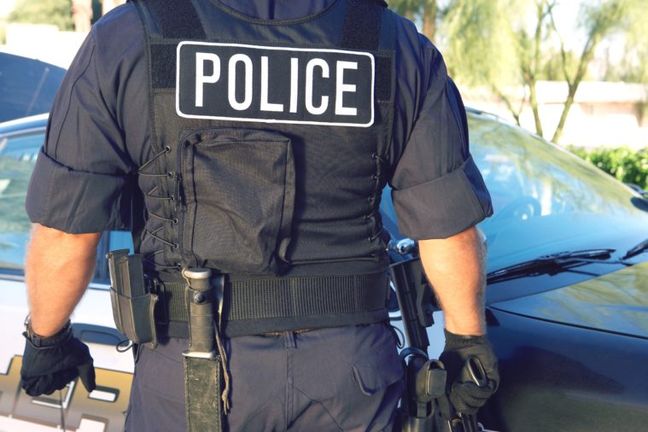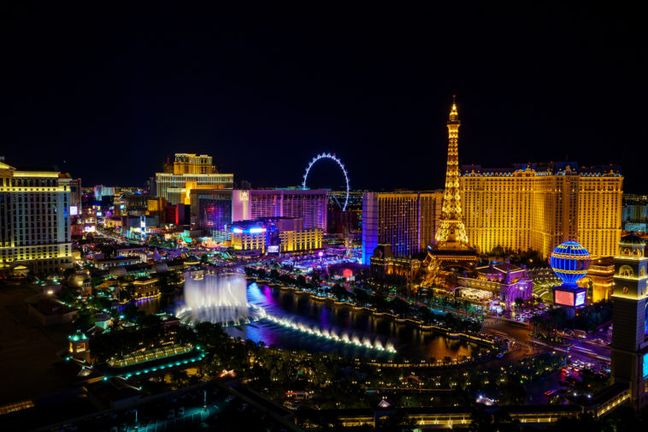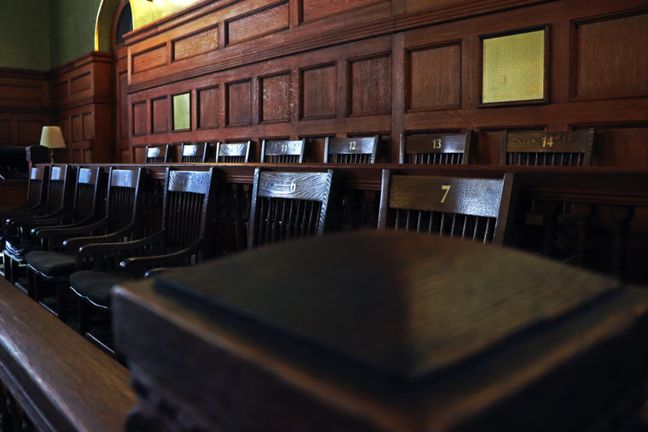Republican Attorneys Gen. Ass’n v. Las Vegas Metro. Police Dep’t, 136 Nev. Adv. Op. 3, 458 P.3d 328 (2020).
Recently, the Nevada Supreme Court published an opinion on an issue of first impression for the court. In Republican Attorneys Gen. Ass’n v. Las Vegas Metro. Police Dep’t (hereinafter referred to as “RAGA v. LVMPD”), the court considered the public’s access to police body camera footage involving juveniles.
Background
In RAGA v. LVMPD, the Republican Attorneys General Association (RAGA) requested body camera footage from an incident in which officers from the Las Vegas Metropolitan Police Department (LVMPD) arrested and/or detained multiple juveniles. Of interest to RAGA was that then-State Senator Aaron Ford was at the scene due to his child’s involvement in the police incident.
RAGA first requested all camera footage and records involving the incident under Nevada Public Records Act (NPRA). The NPRA allows a member of the public to obtain access to public records. However, there are approximately 400 exceptions to the NPRA which block certain information from disclosure. LVMPD invoked one of these exceptions when it denied RAGA’s request, the prohibition against disclosure of juvenile justice information.
Under Nevada law, juvenile justice information is confidential and may only be released under specific circumstances and to specific individuals (e.g., district attorney, the child’s attorney, sheriff, director of juvenile services, etc.). See NRS 62H.025. Unless you are one of the individuals listed in NRS 62H.025, you are prohibited from obtaining the confidential information.
RAGA was not one of the authorized persons under NRS 62H.025. RAGA then sent a narrowed request to LVMPD which excluded juvenile information and “asked only for records relating to or depicting Ford’s interactions with LVMPD officers.” LVMPD denied the narrowed request on the same juvenile justice information grounds.
RAGA then filed a lawsuit in district court, demanding LVMPD turn over the body camera footage and other records of the incident. The district court sided with LVMPD after reviewing the footage, finding all six hours of bodycam video contained juvenile justice information that could not be disclosed. RAGA subsequently appealed the district court ruling.
The Appeal
At the outset, the Nevada Supreme Court confirmed that body camera footage is a public record and subject to NPRA. However, the court went on to hold, “The NPRA, however, expressly yields to confidentiality provisions.” The court found the NPRA explicitly excludes juvenile justice information from NPRA’s disclosure requirements. Furthermore, to the extent a conflicting general statute requiring disclosure of public information exists under Nevada law, “the more specific confidentiality provisions control.”[1]
Redacting juvenile justice information from requested footage.
RAGA argued LVMPD could have redacted the portions of the video that showed juveniles and just included the footage with Ford interacting with the police. To support this position, RAGA pointed out a separate Nevada statute, which states the government cannot deny a request for public records “on the basis that the requested public book or record contains information that is confidential if the governmental entity can redact, delete, conceal, or separate the confidential information from the information included in the public book or record that is not otherwise confidential.”
The court agreed with RAGA that under most circumstances, LVMPD is under an obligation to redact or separate confidential information and then provide the requested public record. However, it still upheld LVMPD’s denial on two grounds: (1) “a governmental entity has no duty ‘to create new documents or customized reports by searching for and compiling information from individuals’ files or other records;’” and (2) if LVMPD redacted all portions of the six-hour video containing juvenile justice information then there would be nothing to turn over anyway.
The court determined any information pertaining to a juvenile that could potentially lead to charges is considered confidential, even if no charges are ever brought against the minor. Thus, in Ford’s case, in the portions of the video involving just Ford and police officers, they are discussing the minors involved in the incident and potential charges. Additionally, the court found it significant that the video depicted the area where the juveniles were detained. Therefore, all the footage was protected from disclosure.
Relevance
The Nevada Supreme Court’s decision in RAGA v. LVMPD appears to enable police and other government agencies to withhold information from a NPRA public records request if the requested information remotely but “directly relates to the arrest of juveniles.“ This issue may come into play in situations where a minor is not a party to the lawsuit but a litigant requests bodycam footage that happens to capture the minor or adults discussing the minor’s actions that may lead to juvenile justice.
Nonetheless, this does not mean such information is unavailable to litigants. It means practitioners need to be creative in how they request information of the government agencies. The RAGA v. LVMPD decision provides some good guidance on the issue. First, determine whether the requested bodycam footage can reasonably be redacted to exclude juvenile justice information. Second, follow the procedure laid out in NRS 62H.025 for requesting juvenile justice information.
Under NRS 62H.025(2)(r), a government agency can release juvenile justice information to a person “authorized by a court order…if the juvenile justice agency was provided with notice and opportunity to be heard before the issuance of the order.” However, the agency can also deny a request if the requester fails to demonstrate good cause for releasing the information or if releasing it “would cause material harm to the child…” Id. at (s). Therefore, practitioners should be prepared to show good cause for needing the material and be creative in showing how the released information would not harm the child.
For example, this could be accomplished through protective orders for the confidential information, or requirements that the requesting party will make any necessary redactions to the video to protect the interests of the minor. The key is to work with the juvenile justice agency, not against it.
[1] The court also cited one of its previous opinions, Piroozi v. Eighth Judicial Dist. Court, 131 Nev. 1004, 1009, 363 P.3d 1168, 1172 (2015) in which it held: “Where a general and a special statute, each relating to the same subject, are in conflict and they cannot be read together, the special statute controls.”

 Author: Christopher Lund
Author: Christopher Lund
 Cannabis Workers Allege Quota to Trim 4 Pounds a Day Violates the California Labor Code
Cannabis Workers Allege Quota to Trim 4 Pounds a Day Violates the California Labor Code
 The Ninth Circuit Reminds Us: Every Word Matters
The Ninth Circuit Reminds Us: Every Word Matters
 NO WAY, PRO SE! The Consequences of Abusing the Judicial System as a Pro Se Litigant in Colorado
NO WAY, PRO SE! The Consequences of Abusing the Judicial System as a Pro Se Litigant in Colorado
 Victim of Financial Mismanagement or Unlawful Retaliation? New Jersey City University Program Founder Claims School Retaliated After Reporting Alleged Sexual Harassment
Victim of Financial Mismanagement or Unlawful Retaliation? New Jersey City University Program Founder Claims School Retaliated After Reporting Alleged Sexual Harassment
 “Real Housewives” Gets a Reality Check
“Real Housewives” Gets a Reality Check
 Missing a Chapter: Insufficiency of Expert Deposition Testimony in Medical Malpractice Litigation
Missing a Chapter: Insufficiency of Expert Deposition Testimony in Medical Malpractice Litigation
 Crash Course: Why Summary Judgment Misses the Mark in Illinois Multi-Cause Limousine Crash Collision
Crash Course: Why Summary Judgment Misses the Mark in Illinois Multi-Cause Limousine Crash Collision
 Bitter Truths: Lead, Cadmium, and Defective Pleadings in California Chocolate Class Action
Bitter Truths: Lead, Cadmium, and Defective Pleadings in California Chocolate Class Action
 The Law of Unintended Consequences: Including Insurance Brokers in Litigation Strategy Communication May Waive the Attorney-Client Privilege
The Law of Unintended Consequences: Including Insurance Brokers in Litigation Strategy Communication May Waive the Attorney-Client Privilege
 Federal Judge Throws Out Portion of Coverage Lawsuit in Nevada
Federal Judge Throws Out Portion of Coverage Lawsuit in Nevada
 Defenses Raised in an Answer Can Be Waived if Not Timely Reaffirmed in Discovery
Defenses Raised in an Answer Can Be Waived if Not Timely Reaffirmed in Discovery
 Nevada Court of Appeals Refuses to Define Breach of the Peace for Self-Help Repossession
Nevada Court of Appeals Refuses to Define Breach of the Peace for Self-Help Repossession
 Defendants Entitled to Attorney Fees as Prevailing Party in Voluntary Dismissal Cases Under Certain Circumstances
Defendants Entitled to Attorney Fees as Prevailing Party in Voluntary Dismissal Cases Under Certain Circumstances
 Nevada Clarifies Exceptions to the American Rule of Attorney Fees
Nevada Clarifies Exceptions to the American Rule of Attorney Fees
 Actual Notice and Mailing Checks in Nevada
Actual Notice and Mailing Checks in Nevada
 Jury Demand within Complaint is Insufficient in Nevada
Jury Demand within Complaint is Insufficient in Nevada